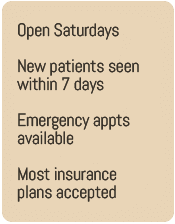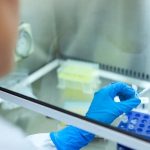Breast Cancer Awareness: Facts, Prevention & Treatment
October is Breast Cancer Awareness Month, an annual health campaign that strives to raise awareness of the disease. Throughout the month of October, breast cancer organizations and charities around the world provide education about breast cancer, bring support to those affected by the disease, and raise money for clinical research.
Breast cancer is one of the most common types of cancer in women in the United States, with more than 270,000 women diagnosed with new breast cancer cases in 2021. While women in the U.S. face a 1 in 8 chance of developing breast cancer in their lifetime, breast cancer death rates dropped 42% from 1989 to 2021.
Doctors believe this decrease is the result of early detection through screening, increased awareness and improved treatment options. There is no doubt National Breast Cancer Awareness Month can provide lifesaving knowledge, and Personalized Hematology-Oncology is committed to doing our part to spread awareness.
What to know about breast cancer prevention
There is no proven way to prevent breast cancer, but there are options that can help lower your risk of developing the disease. These choices can range from living a healthy lifestyle to hormone management.
To lower your risk of breast cancer, you can:
- Reduce alcohol consumption
- Quit smoking
- Maintain a healthy weight
- Stay active
- Breastfeed if you have children
- Limit hormone therapy after menopause
Raising awareness about breast cancer and possible risk factors can help decrease your breast cancer risk. Research shows that living a healthy lifestyle is the best way to reduce your breast cancer risk.
While some choices can be controlled and possibly reduce your risk, other risk factors are out of your control, including:
- Being a woman (men account for less than 1% of breast cancer cases)
- Genetic mutations
- Family history of breast cancer
- Having dense breast tissue
- Starting menstruation before age 12
- Going through menopause after age 55
- Previous radiation therapy
- Exposure to diethylstilbestrol (DES)
Some women have an increased risk of developing breast cancer due to family history or a gene mutation. In such cases, preventative measures like medications and preventative surgery to remove breast tissue can help lower the risk.
How to detect breast cancer
Breast cancer may present no symptoms before diagnosis, which is why regular self-exams and mammograms are so important. Mammograms, a type of x-ray, help with early detection when breast cancer is at its beginning stages and when treatment is most successful.
According to the American Cancer Society, “women who have regular mammograms are more likely to have breast cancer found early, are less likely to need aggressive treatment like surgery to remove the breast (mastectomy) and chemotherapy and are more likely to be cured.”
The American Cancer Society recommends that women aged 45 and up with average risk for breast cancer should have a mammogram screening every year, while women who are high risk should begin annual breast cancer screenings at the age of 30.
How breast cancer is diagnosed
If a screening test indicates you might have breast cancer, a biopsy will be performed to determine if it is cancerous. Fortunately, most biopsy results are benign. However, if a biopsy confirms the cells are cancerous, a doctor must perform further testing. Analyzing and testing the biopsy results will determine the exact type and stage of the cancer, along with how fast it is growing.
During the diagnosis and prognosis period, it is important to openly communicate with your doctor about your specific case to understand estimated survival rates and treatment outlooks.
Breast cancer treatment options
Cancer treatment protocol varies by patient, the type of cancer present and the stage of cancer. Breast cancer treatments have advanced in recent years, and your oncologists can discuss the benefits and risks associated with each approach.
Surgical treatment
Breast cancer patients often undergo surgery as part of their treatment course. Surgery could be performed for numerous reasons, including:
- A mastectomy to remove as much of the cancer as possible
- To find out if the cancer has spread to the lymph nodes under the arm
- Breast reconstruction to restore the breast shape after cancer is removed
- Relieve symptoms of advanced-stage cancer
Radiation
Radiation treatment involves high-energy rays that destroy cancer cells. It can sometimes be used in combination with other treatments. The use of radiation depends on a variety of factors, most commonly if the cancer has spread to the lymph nodes or other parts of the body, if the tumor is large or if it involves skin.
Chemotherapy
While not all breast cancer patients will need this treatment, chemotherapy is a common cancer treatment. Chemotherapy is administered orally or through an IV, and the treatment attacks cancer cells in instances like:
- Killing any remaining cancer cells after surgery
- Shrinking a tumor before surgery to remove it with a less extensive operation
- Advanced stages when cancer has spread
Gene expression profiling
A gene expression profile analysis gives the patient and physician a “blueprint” of the tumor and helps determine which drugs can prevent tumor growth. With this crucial insight, your oncologist can develop a customized treatment protocol – offering the right drug at the right time for each patient. This targeted genome therapy is a specialization only provided by leading oncologists.
Help raise breast cancer awareness
Even if you haven’t been personally affected by breast cancer, increasing awareness about this disease can help provide vital education and support to others in your life.
If you are interested in raising awareness during Breast Cancer Awareness Month, here are ways you can get involved:
- Share a personal story about how breast cancer has affected you or someone you know
- Check out local events and organizations where you can volunteer or make a donation
- Share financial support resources to help families in need
Breast cancer treatment in Raleigh
Personalized Hematology-Oncology provides comprehensive oncology consultation for all types of cancer, including breast cancer. Our experienced oncologists specialize in chemotherapy, molecular targeted therapies and infusion administration. Contact us today to learn more about our cancer treatment capabilities.





